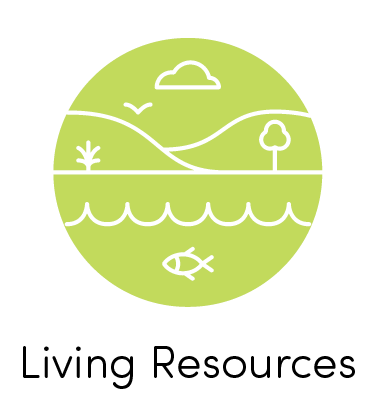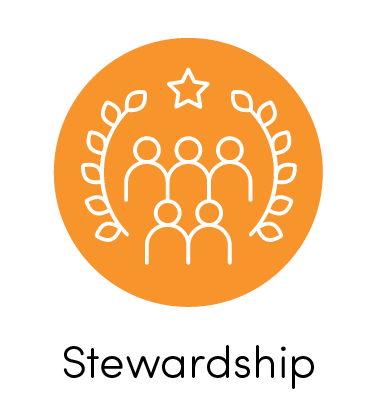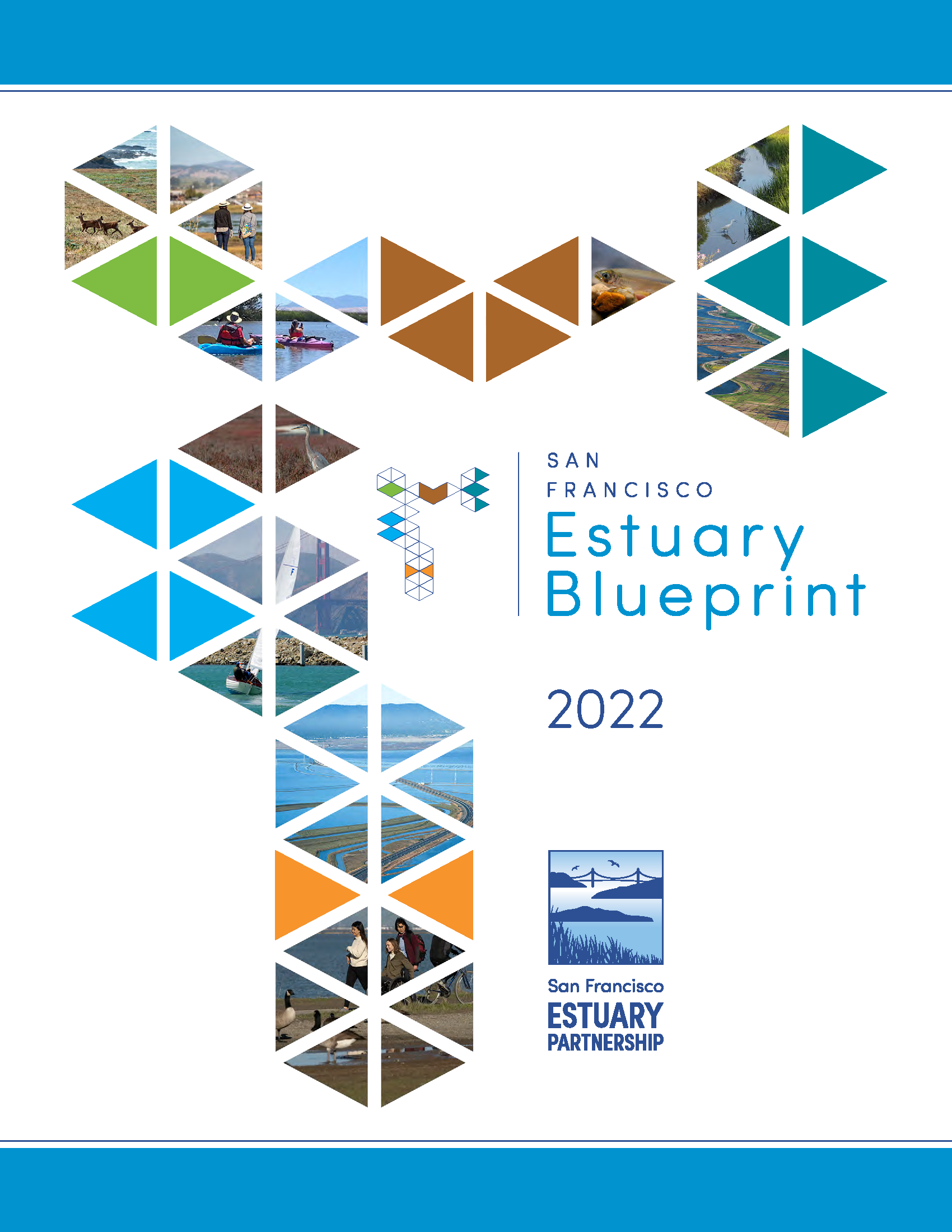Action 1: Climate Resilience
← Back to Estuary Blueprint Actions
Plan for increased climate resiliency that incorporates natural resource protection.
Facilitate regional planning efforts to understand and address climate change impacts and advance climate adaptation that emphasizes the protection of natural resources.
Overview
The Estuary needs robust climate resilience planning to guide major collaborative action in the decades to come. This Action responds to the climate crisis and accelerates regional climate adaptation by setting regional objectives and guidelines, supporting critical climate change science, and advancing adaptation planning at the local level. Natural resources protection and restoration are key components of a regional response to climate change.
Task Description
Implement the Bay Adapt Joint Platform to advance climate adaptation in the lower Estuary that supports protection of the Estuary’s resources and its communities.Task Lead(s)
San Francisco Bay Conservation and Development CommissionTask Collaborating Partner(s)
Local jurisdictions, community-based organizations, environmental organizations, San Francisco Bay Regional Water Quality Control Board, Metropolitan Transportation Commission/Association of Bay Area Governments, San Francisco Estuary Partnership, California State Coastal Conservancy, Bay Area Regional Collaborative, California Department of Transportation, Bay Area Climate Adaptation Network, San Francisco Estuary Institute, San Francisco Bay Regional Coastal Hazards Adaptation Resiliency Group (CHARG), Delta Stewardship Council, Delta Conservancy, U.S. Army Corps of EngineersCost Estimate Key
|
Cost Estimate
$$Milestone(s)
"Vision Statement” for the Bay shoreline that sets a long-term picture of successful adaptation; regional and sub-regional objectives; regional and sub-regional strategies and actions; and guidelines and methodologies for evaluating local plans and projects for funding and other incentives.Task Description
Complete and implement Delta Adapts to advance climate adaptation in the upper Estuary that supports protection of the Estuary’s resources and its communities.Task Lead(s)
Delta Stewardship CouncilTask Collaborating Partner(s)
Local jurisdictions, community-based organizations, environmental organizations, San Francisco Estuary Partnership, San Francisco Estuary Institute, Delta Conservancy, U.S. Army Corps of EngineersCost Estimate Key
|
Cost Estimate
$$Milestone(s)
Delta Adapts Adaptation Strategy.Task Description
Establish a Regional Climate Resilience Equity Consortium run by community-based organizations to provide participation and input on an as-needed basis for climate resilience planning, policy, and implementation projects.Task Lead(s)
Community-based organizations, NorCal Resilience Network, Bay Area Climate Adaptation Network, San Francisco Bay Regional Water Quality Control BoardTask Collaborating Partner(s)
West Oakland Environmental Indicators Project, San Francisco Bay Conservation & Development Commission, Metropolitan Transportation Commission/Association of Bay Area Governments, San Francisco Estuary Partnership, California State Coastal Conservancy, Bay Area Regional Collaborative, National Oceanic and Atmospheric Administration, Delta Stewardship Council, local jurisdictionsCost Estimate Key
|
Cost Estimate
$$Milestone(s)
Workplan including tasks, a cost estimate, and funding analysis for a Regional Climate Resilience Equity Consortium.Task Description
Determine need for new, or modification of existing, regulatory authority to protect shoreline habitats and open space while pursuing measures to protect communities and infrastructure from climate impacts through establishment of a collaborative working group.Task Lead(s)
San Francisco Estuary Partnership (Coordinator)Task Collaborating Partner(s)
Bay Area Council, Sierra Club California, regulatory agenciesCost Estimate Key
|
Cost Estimate
$$Milestone(s)
Shoreline regulatory authority Impact and Needs Assessment.Task Description
Establish an independent Climate Science Consortium that supports needed science and provides high-quality science translation to advance adaptation and resource protection.Task Lead(s)
San Francisco Estuary Institute, Bay Area Climate Adaptation Network, San Francisco Bay Conservation & Development Commission, Metropolitan Transportation Commission/Association of Bay Area GovernmentsTask Collaborating Partner(s)
San Francisco Bay Regional Water Quality Control Board, San Francisco Bay National Estuarine Research Reserve, Delta Stewardship Council, San Francisco Estuary Partnership, California State Coastal Conservancy, Bay Area Regional Collaborative, Bay Area Climate Adaptation Network, National Oceanic and Atmospheric Administration, San Francisco Bay Regional Coastal Hazards Adaptation Resiliency Group (CHARG)Cost Estimate Key
|
Cost Estimate
$$$Milestone(s)
Climate Science Consortium.Task Description
Expand the use of the Adaptation Atlas to support analysis and selection of adaptation strategies within Operational Landscape Units (OLUs) to support natural resource protection and advancement of nature-based strategies.Task Lead(s)
San Francisco Estuary Institute, San Francisco Bay Regional Water Quality Control BoardTask Collaborating Partner(s)
Local jurisdictionsCost Estimate Key
|
Cost Estimate
$$$Milestone(s)
Adaptation strategies for one to two OLUs per year through collaborative process.Task Description
Fund and support completion of robust, coordinated city and county-level adaptation plans that prioritize natural features and ecosystem processes as resiliency strategies.Task Lead(s)
Metropolitan Transportation Commission/Association of Bay Area Governments, San Francisco Estuary Partnership, local jurisdictionsTask Collaborating Partner(s)
Delta Stewardship Council, San Francisco Bay Conservation & Development Commission, California State Coastal Conservancy, Bay Area Regional Collaborative, Bay Area Climate Adaptation Network, San Francisco Estuary Institute, Strategic Growth CouncilCost Estimate Key
|
Cost Estimate
$$$Milestone(s)
Five local adaptation plans that include strategies for protecting natural areas.Task Description
Determine potential influence of rising sea level on groundwater elevations (and contaminated sites) within counties using an interpolated groundwater model based on empirical measurements.Task Lead(s)
San Francisco Estuary Institute, University of California-Berkeley, Pathways Climate InstituteTask Collaborating Partner(s)
Counties, San Francisco Bay Regional Water Quality Control Board, San Francisco Bay Conservation & Development CommissionCost Estimate Key
|
Cost Estimate
$$Milestone(s)
Groundwater data model for nine counties.Updates and Emerging Issues
Since 2016, much progress has been made in climate resilience planning, including completion of local and regional vulnerability assessments (including Adapting to Rising Tides Regional Sea Level Rise Vulnerability and Adaptation Study and Delta Adapts Vulnerability Assessment) and advancement of adaptation strategies (such as Bay Adapt Joint Platform and Delta Adapts Adaptation Plan). The updated Action supports and advances ongoing efforts for regional climate resilience planning with a focus on natural resource protection, as well as addressing the potential mobilization of near shore contaminated groundwater.
Climate Change Considerations
The unpredictability and scale of climate change impacts will be felt regionally, so any planning that enhances resilience will need to be collaborative and coordinated. This Action recognizes the urgency of the climate crisis while exploring long-term solutions that sustain precious ecosystem processes.
Equity Considerations
Climate resilience and adaptation projects will need to pay special attention to social equity, since planning and implementing large projects to prepare the physical environment for sea level rise will inevitably affect the economic and social dimensions of its inhabitants. Furthermore, many nearshore sites with residual contamination in soil are located in underserved communities and communities of color who face health risks with current and future exposure. It is critical that agencies work in partnership with community leadership to address priority concerns.
Blueprint Goals



Connections to Other Actions
Watershed connections provide unique habitat and ecosystem services closely related to or dependent upon:
Action 2: Equity
Action 3: Adaptation Planning
Action 4: Adaptation Implementation
Action 5: Watershed Connections
Action 9: Intertidal / Subtidal Habitats
Action 10: Tidal Marsh
Action 11: Transition Zones
Action 19: Stormwater Management
